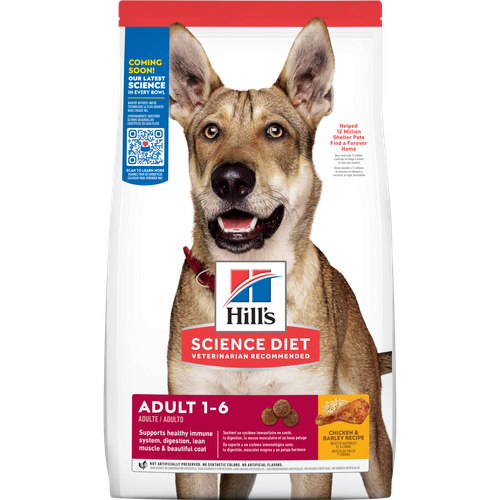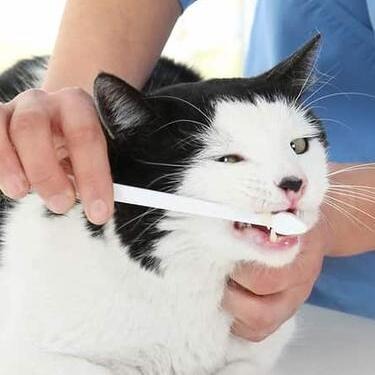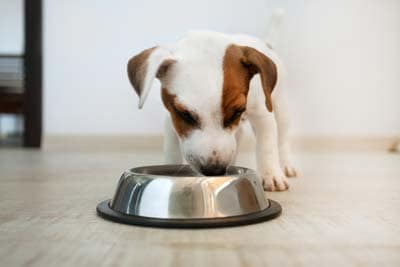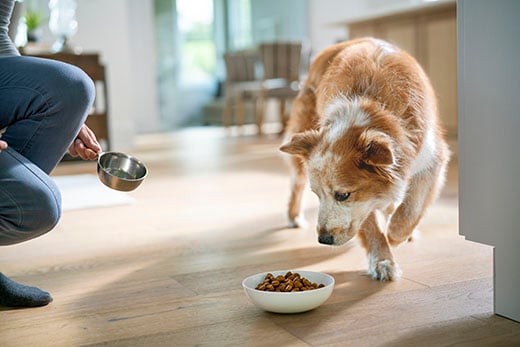
-
Find the right food for your petTake this quiz to see which food may be the best for your furry friend.Find the right food for your petTake this quiz to see which food may be the best for your furry friend.Featured products
 Adult Small & Mini Lamb Meal & Brown Rice Recipe Dog Food
Adult Small & Mini Lamb Meal & Brown Rice Recipe Dog FoodFor the faster metabolism of Small & Mini dogs
Shop Now Puppy Lamb Meal & Brown Rice Recipe
Puppy Lamb Meal & Brown Rice RecipeVital nutrients to support 5 essential building blocks for lifelong health
Shop Now Adult Chicken & Barley Recipe Dog Food
Adult Chicken & Barley Recipe Dog FoodSupports lean muscle and beautiful coat for adult dogs
Shop NowFeatured products Hill's Science Diet Adult Sensitive Stomach & Skin Chicken Recipe Dog Food
Hill's Science Diet Adult Sensitive Stomach & Skin Chicken Recipe Dog FoodHighly digestible recipe, gentle on stomachs. Nourishes skin & promotes a lustrous coat
Shop Now Adult Indoor Chicken Recipe Cat Food
Adult Indoor Chicken Recipe Cat FoodSupports energy level and beautiful fur in indoor cats
Shop Now Adult Chicken & Barley Recipe Dog Food
Adult Chicken & Barley Recipe Dog FoodSupports lean muscle and beautiful coat for adult dogs
Shop Now -
Dog
- Dog Tips & Articles
-
Health Category
- Weight
- Food & Environmental Sensitivities
- Urinary
- Digestive
- Joint
- Kidney
-
Life Stage
- Puppy Nutrition
- Adult Nutrition
- Senior Nutrition
Cat- Cat Tips & Articles
-
Health Category
- Weight
- Skin & Food Sensitivities
- Urinary
- Digestive
- Kidney
-
Life Stage
- Kitten Nutrition
- Adult Nutrition
Featured articles My Pet Ate a Lizard — What Should I Do?
My Pet Ate a Lizard — What Should I Do?Learn what to do if your pet eats a lizard, including whether they can be toxic and symptoms to keep an eye on when they've swallowed one.
Read More Pet Dental Health: What Happens During a Deep Teeth Cleaning?
Pet Dental Health: What Happens During a Deep Teeth Cleaning?Learn about veterinary dental care for your pet, including deep teeth cleaning procedures, which can help your dog or cat maintain proper dental health.
Read More Virtual Vet Visits: What You Need to Know
Virtual Vet Visits: What You Need to KnowLearn the ins and outs of a televet appointment before you talk to a vet online.
Read More -


Growing dogs need plenty of food and your veterinarian may tell you to feed a new puppy a few times a day. However, what about when your dog gets older? You might wonder, "how often should I feed my dog," or "how much should my dog eat?"
To answer those questions, here are some feeding guidelines that cover boisterous puppies, relaxed seniors, and every age in between.
Nourishing a Puppy
Since puppies grow quickly, they need to eat highly nutritious food and they need it often. Since they tend to burn so much energy, you'll start out feeding your puppy frequently, then slowly wean them down to less regular feedings. This process will help them grow big and strong.

6 to 12 Weeks
Puppies should be eating food nutritionally designed to meet their needs for bone and muscle growth, like Hill's® Science Diet® Puppy foods, which fuels your on-the-move puppy. A quality puppy food contains optimal amounts of protein, DHA, and vitamins to keep your puppy growing at appropriate rates. For puppies, four feedings a day are recommended for ages six to twelve weeks. It's also a good idea to start puppies with moistened food to help them chew.
3 to 6 Months
Feedings can decrease to three times a day during this period. You will see your puppy start to mature during this phase — their baby potbelly and pudginess will start to disappear. Its recommended to feed them puppy-sized portions until you see signs that their body is maturing.
6 to 12 Months
At this age, reduce to twice-daily feedings. Keep in mind that after your dog is neutered, their energy level may decrease, so it may be a good time to switch from nutrient-rich puppy food to adult food. While you should always check with your vet about your puppies specific growth, typically smaller breeds should transition to adult food at 10-12 months, while larger breeds may take a little longer — 12–14 months or even longer. Bigger breeds should continue on puppy food longer, up to 14 months.
Not sure what your dog needs? It's also good to make the switch to adult food over a period of a few days. Too abrupt of a change may cause stomach problems for your pooch. To transition between foods, mix your dog's current food while gradually increasing to their new food. Over the course of a week, gradually decrease the amount of the current dog food while increasing the amount of new dog food for a safe and comfortable transition.
As with anything that plays a pivotal role in your dog's overall health and development, talk to your veterinarian about proper feeding regiments. While dog food bags and cans will often provide feeding instructions on the packaging, feeding habits can vary from dog to dog based on breed, weight, health conditions and more. Your vet will be able to provide you the best recommendation to the sized proportions you should be feeding your pup to help set themup healthy growth.


Tasty Tips
Feeding an Adult Dog
Once your dog is fully grown, you need to make sure you're feeding dog food that keeps them healthy and fit, so that they avoid developing health issues. Food type and portion size should be tailored to breed, size, and lifestyle. Again, this is a good conversation to have with your veterinarian to ensure they receive adequate nutrition.
Years 1 to 7
Most owners feed adult dogs two half-portions a day. How much is that? It depends on your dog. Measure food, rather than eye-balling it, to make sure your dog is getting the right amount each day. Keep an eye on your dog for signs of weight gain, and cut down on food if necessary under the supervision of your vet. Some of the signs your dog is overweight include not being able to feel their ribs, loss of a discernible waist, pads of fat over the hips and base of the tail and a waddling gait.
Dogs should eat at regular times, usually once in the morning and once in the evening — the key is consistency. Also, keep in mind that the type of food you choose is important. If you have a more sedentary dog, consider a food that matches their lifestyle to ensure they still get the right nutrients without causing weight gain.
Years 7+
Your dog is getting older, a little slower perhaps. You have to remember dogs age more quickly than people do, so major health changes occur much earlier in life. Choose a food, like Science Diet Senior foods, formulated with ingredients to support brain function, energy, a healthy immune and digestive system and a luxurious coat. Food formulated for aging pets also takes into consideration that they have likely slowed down — this includes their metabolism. Dog foods like Senior Vitality help give your older pup the right amount of calories, while including additional nutrients to help them get that youthful spirit back.
Caring for a Senior
Your dog has officially made it over the hill of middle age. With seniority your dog is changing, so make sure you're keeping an eye on their nutrition and health, and consult your vet to see if you should switch to a senior dog food.

Larger breed dogs may reach seniority sooner than smaller breeds, so it is important to ask your vet when your pooch has reached this phase. For instance, your shih tzu might still be barreling around the house at eleven, but your golden retriever might be slowing down by age seven.
It might be around this time that you'll want to cut back on food to avoid the weight gain that comes with less activity. You should also watch senior dogs for signs of weight loss, which can be a sign of health issues, like dental problems. Continue with twice a day feedings. Your dog may appreciate the routine. If you see changes to your dog's weight or eating habits, talk to your vet.
Feeding your dog the right amount of high-quality dog food through each step of their life will go a long way to keeping your four-legged friend healthy. Just as eating amounts vary from person to person, eating amounts vary from dog to dog, which is why consulting your vet is the best place to start.
Keep in mind the above age ranges and information are just guidelines. Health issues might age your dog faster, or they could remain vital well into their senior years. Monitoring your dog's health, choosing high-quality dog food for every life stage, and keeping an open dialogue with your vet will help you answer how much to feed your dog and make the best choices to nourish your furry friend through puppyhood and into his golden years.


One of our staff authors prepared this article for you
Related products

Vital nutrients to support 5 essential building blocks for lifelong health

Supports lean muscle and beautiful coat for adult dogs

Supports energy level and beautiful coat in mature dogs who prefer smaller kibble

For the faster metabolism of Small & Mini dogs
Related articles

Discover how the field of dog science is giving us more and more insights into the inner workings of our furry best friends.

Your dog's coat and skin are a big part of your dog's overall health. Ensure you keep your dog's coat healthy, by following these simple tips.

Proper nutrition for your pregnant or nursing dog is vital to her and her puppy's health. Learn what you should do provide her with the proper nutrients.

Learn about Hill's puppy food and the nutritional benefit & high quality ingredients that it contains for your pup.

Put your dog on a diet without them knowing
Our low calorie formula helps you control your dog's weight. It's packed with high-quality protein for building lean muscles, and made with purposeful ingredients for a flavorful, nutritious meal. Clinically proven antioxidants, Vitamin C+E, help promote a healthy immune system.
Put your dog on a diet without them knowing
Our low calorie formula helps you control your dog's weight. It's packed with high-quality protein for building lean muscles, and made with purposeful ingredients for a flavorful, nutritious meal. Clinically proven antioxidants, Vitamin C+E, help promote a healthy immune system.

